|
|
|
Sort Order |
|
|
|
Items / Page
|
|
|
|
|
|
|
| Srl | Item |
| 1 |
ID:
139076
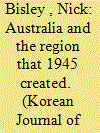

|
|
|
|
|
| Summary/Abstract |
This paper examines the importance of the postwar settlement to Australian international policy. In particular, it considers how the postwar settlement of American regional primacy and economic dominance became built into the foundations of Australian international engagement and its long-term consequences. The first part of the paper explains how this occurred and why it is so important to Australia’s current policy dilemmas. The second part of the paper examines how changes to the fundamental structures of the 1945 regional strategic settlement, focusing primarily on Northeast Asia, are driving shifts in Australian policy. It concludes with a reflection on the choices Australia has made about its strategic future as it is heavily invested in the belief that U.S. primacy can endure over the long term.
|
|
|
|
|
|
|
|
|
|
|
|
|
|
|
|
| 2 |
ID:
099666


|
|
|
|
|
| Publication |
2010.
|
| Summary/Abstract |
Like clockwork, at the end of every decade for the last fifty years, the subject of America's decline comes up. As if on cue, for instance, the National Intelligence Council's November 2008 report, Global Trends 2025, argued that "the international system-as constructed following the Second World War-will be almost unrecognizable by 2025 . . . [It] will be a global multipolar one with gaps in national power continuing to narrow between developed and developing countries." This conclusion represented a striking departure from the NIC's view in 2004 that the United States was likely to continue its dominance of the international system.
|
|
|
|
|
|
|
|
|
|
|
|
|
|
|
|
| 3 |
ID:
092041
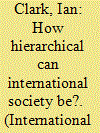

|
|
|
|
|
| Publication |
2009.
|
| Summary/Abstract |
Waltzian analysis proceeds from the distinction between the ordering principles of anarchy and hierarchy. This raises the large question whether the introduction of pockets of 'authority' would represent a fundamental challenge to an anarchical international society. The article investigates this theme by exploring a putative institution of hegemony. It begins with a distinction between primacy and hegemony, and develops the idea of hegemony as a potentially legitimate practice of international society. Since most political systems are 'mixed', it then concludes that adoption of a hierarchical principle of hegemony is no more contradictory for international society than is its development of other such institutions. In common with much recent scholarship, it agrees that international society can function as a form of 'hierarchy under anarchy', within which hegemony could play its part. The article finally demonstrates what is distinctive to hegemonic behaviour, and suggests that practices such as soft balancing do not represent any form of balancing at all, but are better understood as attempts to institutionalise hegemony.
|
|
|
|
|
|
|
|
|
|
|
|
|
|
|
|
| 4 |
ID:
106958
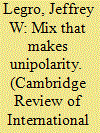

|
|
|
|
|
| Publication |
2011.
|
| Summary/Abstract |
The nature of a global arena dominated by one great power remains a critical subject for understanding international relations. Brooks and Wohlforth's recent book makes an important contribution by arguing that unipolarity poses few constraints to the hegemon and that the United States today should pursue a policy of primacy. The puzzle is that the United States has mostly resisted a primacy policy since becoming the sole superpower, and when it has done so, has often been less successful than the promise of its power advantage. Explaining this puzzle requires building on 'the no constraint' approach to develop a positive theory based on hegemonic purpose, a reformulated notion of constraints, and how purpose and constraints interact to shape outcomes. This reformulation suggests that any American strategy that looks like 'primacy' is unlikely to succeed.
|
|
|
|
|
|
|
|
|
|
|
|
|
|
|
|
| 5 |
ID:
090863
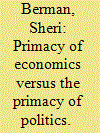

|
|
|
|
|
| Publication |
2009.
|
| Summary/Abstract |
The current economic crisis has once again bought debates about capitalism and globalization to the forefront of the political agenda. Until very recently almost everyone seemed to be convinced that the world was at the dawn of a new era. Yet, the issue at the heart of globalization debates-whether political forces can dominate economic ones or must bow before them-is not new at all. I show that many of the great ideological and political battles of the last century were fought over precisely this ground, and argue that because we have forgotten or misunderstood these earlier debates our current discourse is thin and impoverished. To understand where we are and where we are going, we have to first step back and look closely at where we have been.
|
|
|
|
|
|
|
|
|
|
|
|
|
|
|
|
| 6 |
ID:
106792
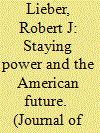

|
|
|
|
|
| Publication |
2011.
|
| Summary/Abstract |
Many scholars, strategists and pundits contend that the US is in decline. They argue that America's national capabilities are significantly eroding, and that with the rise of important regional powers, its primacy in world affairs is rapidly diminishing as well. Yet America continues to possess significant advantages in critical sectors such as economic size, technology, competitiveness, demography, force size, power projection, military technology, and in the societal capacity to innovate and adapt. This article argues that the nature of material problems has been overstated, and that the US should be able to withstand modest erosion in its relative strength for some time to come without losing its predominant status. Instead, where limits to American primacy do exist, they are as or more likely to be ideational as they are material. The problem inheres as much or more in elite and societal beliefs, policy choices, and political will, as in economic, technological or manpower limitations at home, or the rise of peer competitors abroad.
|
|
|
|
|
|
|
|
|
|
|
|
|
|
|
|
| 7 |
ID:
097850
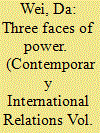

|
|
|
| 8 |
ID:
088554


|
|
|
|
|
| Publication |
2009.
|
| Summary/Abstract |
English School (ES) writers have never developed a systematic account of hegemony, and most set out with assumptions that are `antihegemonial'. The writings of Hedley Bull, in particular, appeared to reject any notion of a legitimate hegemony. However, a social theory of hegemony that emphasizes its consensual nature does appear consistent with other ES positions, particularly on the role of the Great Powers. This article excavates an ES theory of hegemony. It develops the argument for hegemony as a potential institution of international society, by analogy with the role of the Great Powers, and by extension of other ES principles. This stresses not just the material power of the Great Powers, but their degree of social recognition. Accordingly, it suggests that such a view of hegemony is no more paradoxical than, say, ES acceptance of war as a similar institution. This fills a major void in ES theory which otherwise has nothing of interest to say about international order in conditions of primacy.
|
|
|
|
|
|
|
|
|
|
|
|
|
|
|
|
| 9 |
ID:
090264


|
|
|
|
|
| Publication |
2009.
|
| Summary/Abstract |
English School (ES) writers have never developed a systematic account of hegemony, and most set out with assumptions that are `antihegemonial'. The writings of Hedley Bull, in particular, appeared to reject any notion of a legitimate hegemony. However, a social theory of hegemony that emphasizes its consensual nature does appear consistent with other ES positions, particularly on the role of the Great Powers. This article excavates an ES theory of hegemony. It develops the argument for hegemony as a potential institution of international society, by analogy with the role of the Great Powers, and by extension of other ES principles. This stresses not just the material power of the Great Powers, but their degree of social recognition. Accordingly, it suggests that such a view of hegemony is no more paradoxical than, say, ES acceptance of war as a similar institution. This fills a major void in ES theory which otherwise has nothing of interest to say about international order in conditions of primacy.
|
|
|
|
|
|
|
|
|
|
|
|
|
|
|
|
| 10 |
ID:
154809


|
|
|
|
|
| Summary/Abstract |
The foreign policy crises that the USA has confronted under the administration of President Barack Obama have generated profound uncertainty about whether the USA can maintain what has been its consistent grand strategy since the end of the Cold War: primacy. The authors argue, drawing on a neoclassical realist framework, that this uncertainty has been driven not so much by fundamental changes in the international system itself, but rather by how such changes have been interpreted by the Obama administration and its critics. US grand strategy is now caught between approaches best described as the ‘decline management’ of the Obama administration and the ‘decline denial’ of president Donald Trump, which reflects the fracturing of the domestic ‘political support system’ that has underpinned primacy since the end of the Cold War.
|
|
|
|
|
|
|
|
|
|
|
|
|
|
|
|
|
|
|
|
|